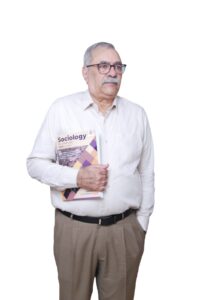Course Content
1.Sociology - The Discipline:
(a) Modernity and social changes in Europe and emergence of sociology.
(b) Scope of the subject and comparison with other social sciences.
(c) Sociology and common sense.
2.Sociology as Science:
(a) Science, scientific method, and critique.
(b) Major theoretical strands of research methodology.
(c) Positivism and its critique.
(d) Fact value and objectivity.
(e) Non-positivist methodologies.
3.Research Methods and Analysis:
(a) Qualitative and quantitative methods.
(b) Techniques of data collection.
(c) Variables, sampling, hypothesis, reliability, and validity.
4.Sociological Thinkers:
(a) Karl Marx – Historical materialism, mode of production, alienation, class struggle.
(b) Emile Durkheim – Division of labour, social fact, suicide, religion, and society.
(c) Max Weber – Social action, ideal types, authority, bureaucracy, Protestant ethic, and the spirit of capitalism.
(d) Talcott Parsons – Social system, pattern variables.
(e) Robert K. Merton – Latent and manifest functions, conformity and deviance, reference groups.
(f) Mead – Self and identity.
5.Stratification and Mobility:
(a) Concepts – equality, inequality, hierarchy, exclusion, poverty, and deprivation.
(b) Theories of social stratification – Structural functionalist theory, Marxist theory, Weberian theory.
(c) Dimensions – Social stratification of class, status groups, gender, ethnicity, and race.
(d) Social mobility – open and closed systems, types of mobility, sources and causes of mobility.
6.Works and Economic Life:
(a) Social organization of work in different types of society – slave society, feudal society, industrial/capitalist society.
(b)Formal & Informal organisation of work
(c)Labour and Society
7.Politics and Society:
(a) Sociological theories of power.
(b) Power elite, bureaucracy, pressure groups, and political parties.
(c) Nation, state, citizenship, democracy, civil society, ideology.
(d) Protest, agitation, social movements, collective action, revolution.
8.Religion and Society:
(a) Sociological theories of religion.
(b) Types of religious practices: animism, monism, pluralism, sects, cults.
(c) Religion in modern society: religion and science, secularization, religious revivalism, fundamentalism.
9.Systems of Kinship:
(a) Family, household, marriage.
(b) Types and forms of family.
(c) Lineage and descent.
(d) Patriarchy and sexual division of labour.
(e) Contemporary trends.
10.Social Change in Modern Society:
(a) Sociological theories of social change.
(b) Development and dependency.
(c) Agents of social change.
(d) Education and social change.
(e) Science, technology, and social change.

Reach out for Guidance and Mentorship
“Ready to take your preparation to the next level? Contact Upendra Gaur Sir for personalized guidance”
